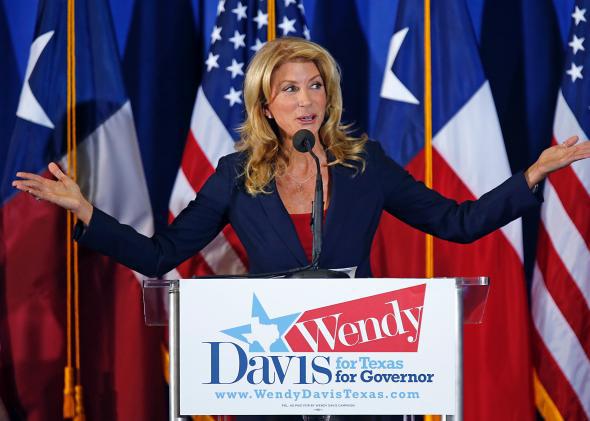Wendy Davis’ run for governor has always been a long shot. The Texas state senator rose to national prominence just a year ago when she filibustered an omnibus abortion restriction bill clad in bright pink sneakers. The event cemented Davis’ place as a feminist icon across America, but back in Texas, the bill eventually passed anyway.
Now, for all the support Davis’ campaign has received from fellow Democrats in Washington and elsewhere—former Michigan Gov. Jennifer Granholm called her “Joan of Arc, standing up there for women all across the country”—she’s still running for governor of a deeply red state. That means that the issue that made her a national star—abortion—is one she can’t really touch back at home. As NPR’s Wade Goodwin explains, “Her claim to fame is her filibuster against abortion restrictions, but in 2014, most Texas voters favor such legislation. So the candidate has mostly avoided talking about her signature issue.”
On Sunday, the New York Times published a big article outlining Davis’ campaign missteps. Initial poll numbers don’t look good. But whether she wins in Texas is somewhat beside the point, at least as far as her status as a national icon is concerned. As we head down the long road to the 2016 elections, Wendy Davis’ campaign serves as proof that a lot of people across the country can get fired up about women’s health and that hashtag activism can have concrete results.
One year ago, there was zero national coverage of Davis’s filibuster until it started trending on Twitter. The hashtag that coalesced around the filibuster, #standwithwendy, moved people to storm the statehouse and prevented the abortion bill from being passed that night. The social media storm also led to incredible grassroots support of Davis. “She and her aides note that no other Democratic candidate for a statewide-elected office in Texas history has amassed more individual donors (133,000) or more volunteers (20,000),” Manny Fernandez wrote in the New York Times.
As Texas state Rep. Donna Howard has pointed out, the momentum hasn’t stopped at Davis’ campaign. Howard believes the level of pro-choice activism in the state has risen tenfold in the past year. And NARAL Pro-Choice Texas executive director Heather Busby says that after last summer’s filibuster, her organization has seen membership double. “There was definitely a concern about whether or not that energy would continue, and it has,” Busby told me. “Every single training, every panel discussion, and every event since last summer has seen amazing energy and attendance.”
Davis has also clearly left a mark across the U.S.: A geotagged Twitter map of #standwithwendy tweets featured in Wired showed that states like Oregon and Montana recorded more tweets than the national average. It’s not surprising, then, that when a women’s health care clinic was vandalized in Kalispell, Montana, Pro-Choice Montana raised double their online fundraising goal. There’s no direct line between Davis’ filibuster and the Montana clinic fundraiser. But both show that across the country, supporters of women’s health are galvanized, and they’re willing to put their money where their mouths are. In the wake of today’s Supreme Court Hobby Lobby decision, which allows companies to avoid subsidizing their employees’ contraception, those supporters are showing their understandable rage with the hashtag #notmybossbusiness. The decision is a bummer, but the righteous anger is an early sign that supporters of women’s rights will be a force to reckon with come 2016.
